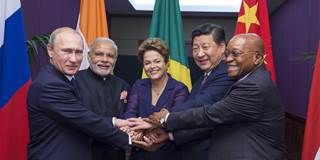What the BRICS countries have in common is their exclusion from the places they believe they deserve in the current world order. This month's first-ever BRICS parliamentary forum was just the latest in an expanding array of institutions and formal structures that the group has launched with the aim of changing that.
BEIJING – Sailing down the Moscow River on a cool evening earlier this month, I found myself in intense conversation with the chair of the Foreign Affairs Committee of the Chinese National People’s Congress (NPC). Meanwhile, South African and Brazilian parliamentarians were swaying to Russian music and a guide pointed out the sights. The first parliamentary forum of the BRICS countries – Brazil, Russia, India, China, and South Africa – had come to a convivial conclusion.
Before the meeting opened, many wondered whether the five parliaments could possibly find common ground. What on earth could India’s fractious and rumbustious Lok Sabha, with its impassioned debates and disruptions, have in common with China’s decorous NPC, a rigorously controlled echo chamber for Communist Party decisions? Membership in the new BRICS grouping, many believed, did not provide a strong enough basis for cooperation.
Such skepticism has been leveled at the BRICS grouping itself from its inception, with some dismissing it as the only international organization invented by an investment bank. Specifically, the term BRIC was coined more than a decade ago by then-Goldman Sachs analyst Jim O’Neill, who did not initially count South Africa among the ranks of the major emerging economies.

BEIJING – Sailing down the Moscow River on a cool evening earlier this month, I found myself in intense conversation with the chair of the Foreign Affairs Committee of the Chinese National People’s Congress (NPC). Meanwhile, South African and Brazilian parliamentarians were swaying to Russian music and a guide pointed out the sights. The first parliamentary forum of the BRICS countries – Brazil, Russia, India, China, and South Africa – had come to a convivial conclusion.
Before the meeting opened, many wondered whether the five parliaments could possibly find common ground. What on earth could India’s fractious and rumbustious Lok Sabha, with its impassioned debates and disruptions, have in common with China’s decorous NPC, a rigorously controlled echo chamber for Communist Party decisions? Membership in the new BRICS grouping, many believed, did not provide a strong enough basis for cooperation.
Such skepticism has been leveled at the BRICS grouping itself from its inception, with some dismissing it as the only international organization invented by an investment bank. Specifically, the term BRIC was coined more than a decade ago by then-Goldman Sachs analyst Jim O’Neill, who did not initially count South Africa among the ranks of the major emerging economies.